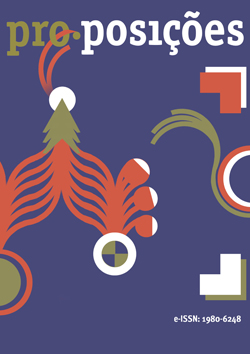Abstract
This paper focuses on English language Brazilian teachers’ in service education who participated in a program in the United States of America from 2010 to 2013. The main objective is to present and discuss how a certain social imaginary underpins the so-called teaching vocation and teachers’ aspirations. It is a qualitative case study, and it has as theoretical basis the concept of social imaginary, and the decolonialist perspective. The methodology consisted of literature research, analyses of participants’ curriculum vitae published on the Lattes Plataform/CNPq, online questionnaires, semi-structured interviews, and statements. Amongst the main findings we name the fact that this imaginary hides the reasons that put the quality of public education at stake.
References
Andreotti, V. (2015). The educational challenges of imagining the world differently. Canadian Journal of Development Studies, 37(1), 101-112.
Andreotti, V., Stein, S.; Bruce, J., & Susa, R. (2016). Towards Different Conversations About the Internationalization of Higher Education. Comparative and International Education/Éducation Comparée et Internationale, 45(1), 2-18.
Appadurai, A. (1996). Modernity at large: cultural dimensions of globalization Minneapolis: University of Minnesota Press.
Apple, M., Kenway, J., Singh, M. (Eds.) (2005). Globalizing education: policies, pedagogies, and politics New York: Peter Lang Publishing.
Bernat, E. (2008). Towards a pedagogy of empowerment: The case of ‘impostor syndrome’ among pre-service non-native speaker teachers in TESOL. English Language Teacher Education and Development Journal, 11, 1-8.
Brasil. (2013). Relatório de Gestão da Diretoria de Formação de Professores da Educação Básica – DEB 2009-2013. Brasília, MEC.
Brasil. (2015). Relatório de Gestão da Diretoria de Formação de Professores da Educação Básica – DEB 2009-2014, I Brasília, MEC.
Brasil. (2015). Relatório de Gestão da Diretoria de Formação de Professores da Educação Básica – DEB 2009-2014, II Brasília, MEC.
Jordão, C., Martínez, J. (2015). Entre as aspas das fronteiras: internacionalização como prática agonística. In C. Rocha, D. B. Braga, & R. R. Caldas (Orgs.), Políticas linguísticas, ensino de línguas e formação docente: Desafios em tempos de globalização e internacionalização (pp. 61-87). Campinas: Pontes Editores.
Kachru, B. B. (2005). Asian Englishes: Beyond the Canon Hong Kong: Hong Kong University Press.
Knight, J. (2014). International education hubs: student, talent, knowledge-innovation models New York: Springer.
Memorando de Entendimento sobre Educação entre o Governo da República Federativa do Brasil e o Governo dos Estados Unidos da América. (1997). Recuperado de http://dai-mre.serpro.gov.br/atos-internacionais/bilaterais/1997/b_87_2011-09-01-14-10-17/
Mignolo, W. (2003). Globalization and the geopolitics of knowledge: the role of humanities in the corporate university. Neplanta: Views from South, 4(1), 97-119.
Mok, K. H. (2007). Questing for internationalization of universities in Asia: Critical reflections. Journal of Studies in International Education, 11(3-4), 433-454.
Naidoo. R. (2011). Rethinking development: Higher education and the new imperialism. In R. King, S. Marginson, & R. Naidoo (Eds.), Handbook on globalization and higher education (pp. 40-58). Cheltenham: Edward Elgan Publishing.
Ortiz, R. (2003). Mundialização e Cultura São Paulo: Brasiliense.
Quijano, A. (1997). Colonialidad del poder, eurocentrismo y América Latina. Anuario Mariateguiano, 10(9): 113-121. Recuperado de http://www.decolonialtranslation.com/espanol/quijano-colonialidad-del-poder.pdf
Rizvi, F., Lingard, B. (2010). Globalizing education policy New York: Routledge.
Said, E. (2007). Orientalismo: o Oriente como invenção do Ocidente São Paulo: Companhia das Letras.
Santos, B. S. (2007). Para além do pensamento abissal: das linhas globais a uma ecologia de saberes. Novos estudos Cebrap, 79, 71-94. doi:10.1590/S0101
Spivak, G. (1988). Can the subaltern speak? In C. Nelson, L. Grossberg (Eds.) Marxism and the interpretation of culture (pp. 271-313). Basingstoke: Macmillan Education.
Spring, J. (2014). Globalization of Education: an introduction, 2nd ed., New York: Routledge.
Sridhar, S. N. (2016). A Cultural Warrior Rests His Case- Braj. B. Kachru Recuperado de http://www.iaweworks.org/
Subedi, B. (2013). Decolonizing the curriculum for global perspectives. Educational Theory, 63(6), 621-638.
Tardif, M. (2000). Saberes profissionais dos professores e conhecimentos universitários: Elementos para uma epistemologia da prática profissional dos professores e suas conseqüências em relação à formação para o magistério. Revista Brasileira de Educação, 13, 5-24.
Taylor, C. (2002). Modern social imaginaries. Public Culture, 14(1), 91-124.
Zemach-Bersin, T. (2007). Global citizenship and study abroad: it’s all about US. Critical Literacy: Theories and Practices, 1(2), 16-28.

This work is licensed under a Creative Commons Attribution 4.0 International License.
Copyright (c) 2021 Rosane Karl Ramos, Maria Inês Marcondes de Souza


